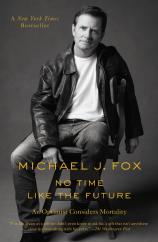Reading Group Guide
Discussion Questions
No Time Like the Future: An Optimist Considers Mortality

1. Actor/activist Michael J. Fox was diagnosed with young-onset Parkinson’s in 1991 at age 29. How much did you know about the disease before reading NO TIME LIKE THE FUTURE? Were you aware that someone so young could get this disease?
2. The subtitle of the book is “An Optimist Considers Mortality.” Were you surprised at how candid Fox was about his diminishing optimism? How would you describe your own mindset? Are you an optimist or a pessimist? Did this change as a result of the COVID-19 pandemic? How did your optimism or pessimism affect your response to the events of 2020-2021?
3. Fox’s father-in-law, Stephen Pollan, taught him the maxim “With gratitude, optimism becomes sustainable.” How does gratitude play into your outlook?
4. 2018 was Fox’s “annus horribilis” or “horrible year,” due to his spinal surgery and other injuries, in addition to his Parkinson’s. Many readers have experienced 2020 as a “horrible year” of their own. How did you deal with it? Did anything positive come out of it?
5. Have you ever known someone with Parkinson’s, or are you living with the disease yourself? Did you learn more about it after reading NO TIME LIKE THE FUTURE? Have you read any of Fox’s earlier titles: LUCKY MAN, ALWAYS LOOKING UP, or A FUNNY THING HAPPENED ON THE WAY TO THE FUTURE?
6. Fox writes about his gratitude for the support of his wife, Tracy Pollan, and their four children. Having supportive people around can make a big difference when dealing with chronic disease. Have you ever been the support system for someone living with an illness? Or have you relied on someone close to you during an illness of your own? What key attributes are essential to provide support?
7. What was your impression of Fox before reading this book? What’s your impression now?
8. After his fall in August 2018, on the heels of his spinal surgery and recovery, Fox thought, “Make lemons into lemonade? Screw it --- I’m out of the lemonade business.” Have you ever had your optimism tested as he did? What did you do to regain a positive attitude?
9. The Michael J. Fox Foundation for Parkinson’s Research was founded in 2000 and has raised more than $1 billion in funding for research. How do you think his charitable work with the foundation has affected his attitude toward his disease? How do you think our service to others helps us get through our own life challenges?
10. In the wake of his mobility issues, Fox decided to take up golf in his 40s. Why do you think challenging himself with a new sport was something he needed to do?
11. Fox had to shift his perspective on his acting career as his disease progressed, choosing smaller, more supportive roles instead of being the leading man. He has said that he “[doesn’t] miss being the leading man. I think of that Hollywood truism that explains the difference between a short actor and a short movie star: to appear taller in a shot, a short actor stands on a box, while a short movie star makes everyone else stand in a ditch. I had discovered the simple pleasures of the ditch, where vanity has no value.” While most of us are not movie stars, how do you think Fox’s insight about “the simple pleasures of the ditch” relates to everyday people?
12. Have you seen Fox’s more recent roles on “The Good Fight” or “Rescue Me”? How do you think he handled the transition to being a character actor?
13. Despite the numerous and arduous challenges that Fox has endured, he found his way back to his optimistic nature. Did you ever doubt he would get there?
14. What is your biggest takeaway after reading NO TIME LIKE THE FUTURE?
No Time Like the Future: An Optimist Considers Mortality
- Publication Date: December 7, 2021
- Genres: Memoir, Nonfiction
- Paperback: 256 pages
- Publisher: Flatiron Books
- ISBN-10: 1250265630
- ISBN-13: 9781250265630






